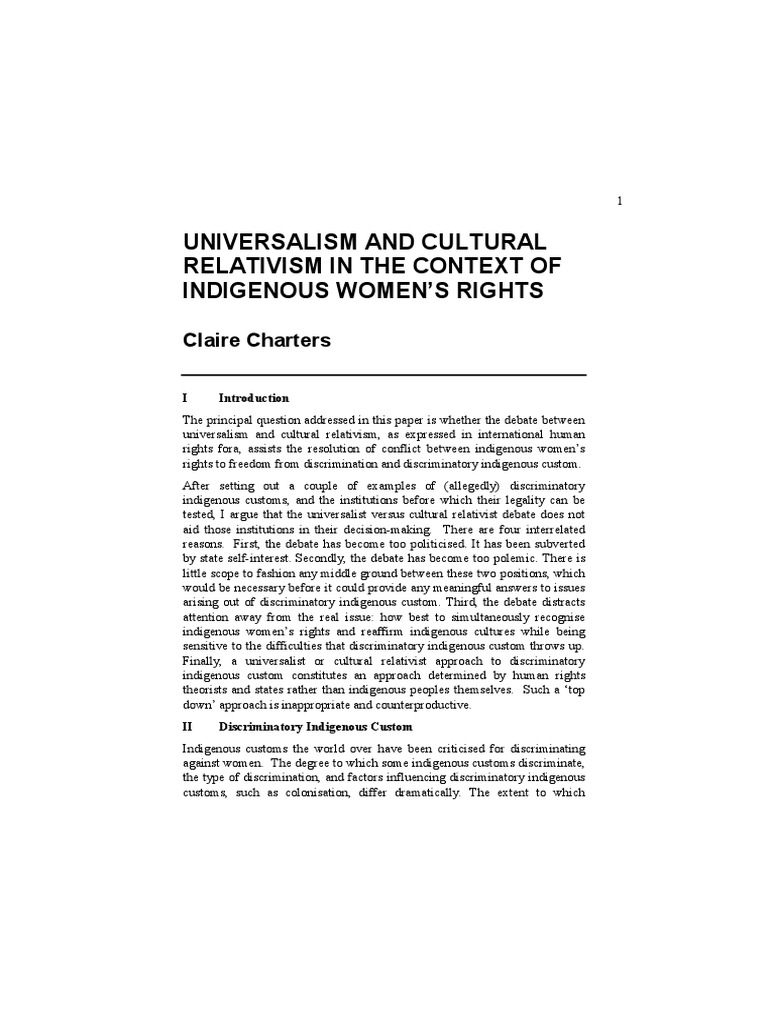Universalism and relativism stand as two prominent philosophical paradigms that frequently collide in discussions surrounding ethics, culture, and human rights. On the surface, the ideological divide between these two perspectives seems insurmountable, drawing practitioners into polarized camps. However, a nuanced exploration reveals that reconciling universalism with relativism may not only be feasible but also indispensable in fostering a harmonious coexistence amid a diverse global landscape.
To begin, it is crucial to delineate what is meant by universalism and relativism. Universalism posits that there exist certain rights and values universally applicable to all human beings, regardless of cultural or societal context. This perspective argues for the existence of common human rights—principles that transcend geographic, cultural, and temporal boundaries. In contrast, relativism contends that beliefs, values, and practices are inherently context-dependent, asserting that morality and ethics are shaped by unique cultural, social, and historical contexts. Thus, what is deemed ‘right’ in one culture may be perceived as ‘wrong’ in another, leading to a profound inquiry: How can we effectively bridge this chasm?
One significant challenge in reconciling these two perspectives lies in the implicit assumptions underlying each viewpoint. Universalists may contend that ethical norms derived from human rights documents—such as the Universal Declaration of Human Rights—are inalienable truths that ought to be upheld globally. Conversely, relativists argue that such norms often reflect Western ideologies, which may not align with the cultural fabric of non-Western societies. This critique raises a crucial point: the need for cultural sensitivity and awareness of the multiplicity of human experiences.
To navigate these complex waters, one might consider the concept of ‘cultural pluralism’ as a potential bridge. This term refers to the recognition and appreciation of diverse cultural identities within a shared framework. By adopting a pluralistic lens, individuals can foster dialogue and cultivate understanding between divergent cultural teachings while still holding space for universal principles. For instance, the core values of respect, compassion, and dignity can resonate across varying cultures, creating a common ground that facilitates collaborative efforts in the pursuit of collective goals.
Moreover, engaging in genuine intercultural dialogue is paramount in forging reconciliatory pathways. It fosters an atmosphere where both universalist and relativist perspectives can be articulated, discussed, and ultimately synthesized. Such dialogue encourages the exploration of commonalities while also recognizing differences. Acknowledging that cultural practices may contain wisdom that enriches universal values can enhance mutual respect and understanding. This process involves active listening and openness, allowing space for marginalized voices often drowned out in debates dominated by dominant narratives.
Another approach involves the notion of ‘contextual globalization.’ This concept suggests that while globalization is undoubtedly a pervasive force, it can also serve as a conduit for localized responses that reflect universal principles. For example, environmental sustainability stands as a global challenge that transcends cultural borders. By centering universal ecological values in discussions, societies can collaborate on solutions that are tailored to local contexts, thus harmonizing universal standards with culturally sensitive practices. This duality can strengthen local governance and global initiatives, demonstrating that universalism does not negate the importance of cultural context.
Leadership plays an essential role in this reconciliatory endeavor. Global leaders and local community figures must embody the commitment to uphold universal principles while simultaneously advocating for cultural sovereignty. Leaders who appreciate the duality of these paradigms can inspire transformative movements capable of addressing significant global issues like climate change, economic disparity, and social injustice. An effective leader should exhibit moral fortitude, blending universal ideals with a profound respect for local cultures, fostering a semblance of cooperative action.
Furthermore, education emerges as a vital pillar in reconciling universalism and relativism. An educational framework that emphasizes critical thinking, multicultural literacy, and ethical reasoning can empower individuals to navigate complex moral dilemmas. By instilling a deep appreciation for varied cultural perspectives alongside universal human values, future generations can aspire to build a more inclusive and ethically diverse society. Developing curricula that challenge students to confront real-world dilemmas through the dual lenses of universalism and relativism can deepen their understanding and appreciation of our shared humanity.
In conclusion, reconciling universalism with relativism is not only an intellectual exercise but a necessary endeavor in our increasingly interconnected world. By acknowledging the intricate cultural tapestries that constitute human existence, fostering intercultural dialogue, and advocating for contextual globalization, it becomes possible to constructively merge these often competing ideologies. Education, strong leadership, and a commitment to mutual respect are essential ingredients in this reconciliation process. As the world grapples with profound challenges, the synthesis of universal and relativist principles may ultimately pave the way for a more equitable and harmonious global community, capable of rising to meet the pressing issues of our time.
